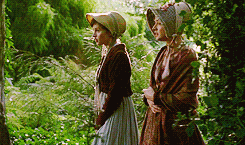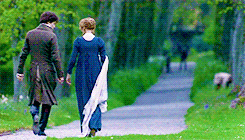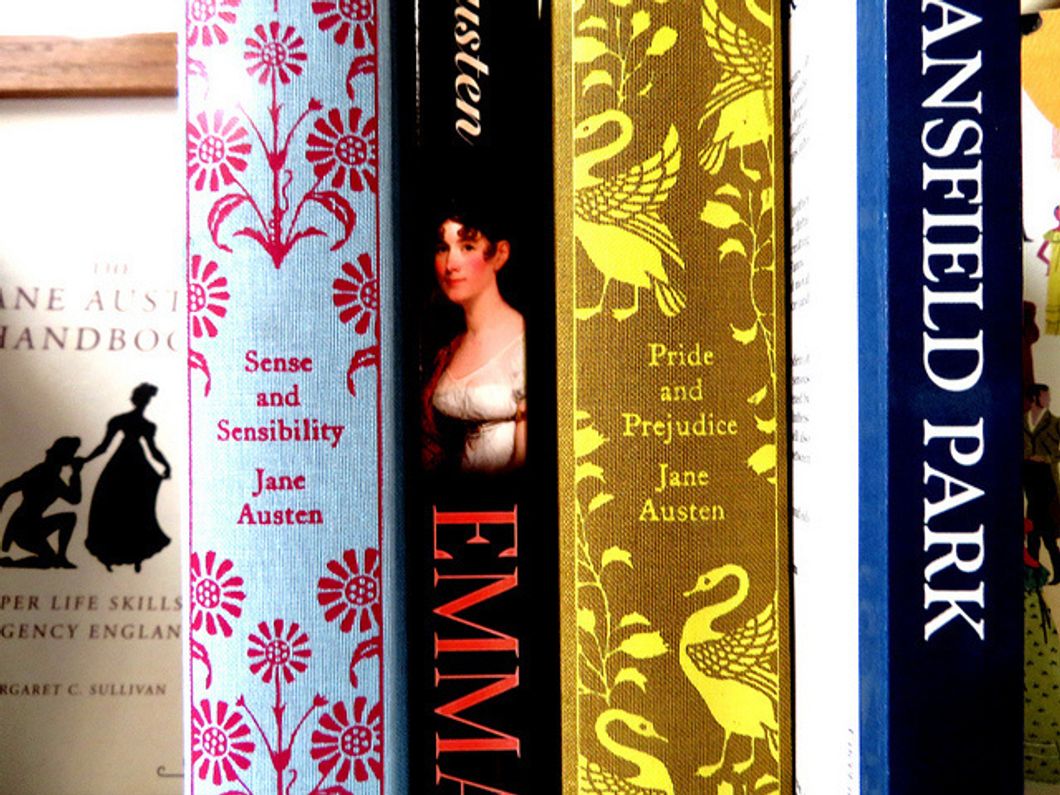Jane Austen has made her mark on history as the most epic love story writer there ever was. Her novels have blessed us with the dashing Mr. Knightley, a Pinterest board full of empire-waisted ballgowns, unrealistic expectations of formal events, and young Colin Firth in a flowy white shirt.
As dreamy as these times (and men) were, most of the attributes so admired by Jane Austen can still be easily applied today. The protagonists of each Austen story share characteristics most women still strive for in modern times. From Elizabeth Bennet to Emma Woodhouse, each Austen heroine has a quality or two we can all strive to obtain.
1. Confidence in yourself
 Giphy
GiphyIt is no secret every Austen woman ends her tale with a fabulous "happily ever after" in the comfort of her new, financially stable, husband's home. Even so, few of her characters find their purpose through marriage. Neither Elizabeth Bennet nor Emma Woodhouse were looking for a spouse when their soulmates walked into their lives. Instead, they were confident with who they were, as well as who they were becoming. Elizabeth took pride (pun intended) in her independence and intelligence, just as Emma never apologized for her love of match-making and party planning.
2. Value in the friendships in your life
 Giphy
GiphyIt is easy for us to focus too eagerly on what a romance will bring into our lives and forget to enjoy the friendships already present. Austen's tales of sisterhood draw romance readers back into the reality of how beautiful friendship can be. From the frantic Bennet ladies to the loyal Dashwood sisters, these women band together through thick and thin, picking one another up when the other is down and making the best of the worst days. Had their stories taken place now, they likely would have bonded over "Bachelor" watch parties and sending "we love a smart sister" texts when she accomplishes something.
3. Knowledge of your self-worth
 Giphy
GiphyTo quote a meme my sister sent to me once, "don't let guys treat you like free salsa, you are guac baby girl." Did Elinor Dashwood even know what guacamole was? Probably not (bless her heart,) but she still knew she deserved better than to be left by a man for another woman. She did not run after Edward or beg him to love her more but waited for the day when he would come to his senses and choose to be with her. Ladies, you are the guac; do not settle for anyone who treats you like less than extra.
4. Patience in waiting for the best to come
 Giphy
GiphyAt the end of the day, there always seems to be something we are eager for waiting just around the corner. It could be graduation, an engagement, a career, or the twice-a-semester nacho bar in the dining hall next to your residence hall. In situations such as these, it is important to practice patience, just as Anne Eliot did when she waited for her old boyfriend to ask for her hand in marriage after seven years apart (which is like two decades in nineteenth-century years.) Rather than make quick decisions on their relationship, Anne waited for the right timing, greatly paying off for her relationship with Captain Wentworth, as well as readers everywhere who swoon every single time they read that last letter. Forget "half agony, half hope;" I am all heart-eyes.
5. Handling every situation with class and grace
 Giphy
GiphyThe ladies of Austen's worlds were not all dinner parties and "walks around the drawing room." These were realistic women, composed of similar frustrations and anxieties to the ones we face today. Did they let their temper get the best of them? Did they make rude comments about their next-door neighbors? Yes. (Didn't expect that answer, right?) Yes, these ladies made mistakes and poor choices, but they never ran away from their wrong-doings.
Instead, they owned up to them with poise, apologizing when necessary and occasionally admitting they were mistaken. I would be lying if I said Elizabeth Bennet's apology to Mr. Darcy did not bring my own sense of pride into question. She did not make a fool of herself in any way but matter-of-factly addressed the misunderstanding for what it was. Why make such a minor part of the novel - uh, I mean relationship - more problematic than necessary?
So maybe Mr. Knightley is not an exact replication of the men we see on campus every day, but we are not exactly Emma Woodhouses either. Why not make that change? Sure, the empire-waisted gowns were atrocious, but I see no reason why we cannot embody the characteristics of an Austenian woman in our ripped jeans and over-sized sweatshirts.
















